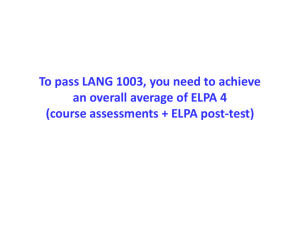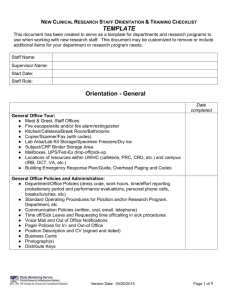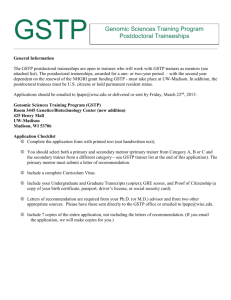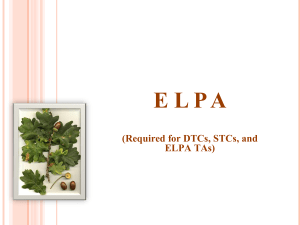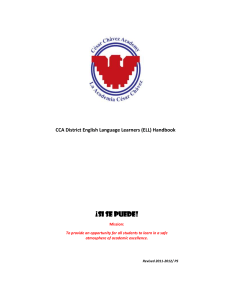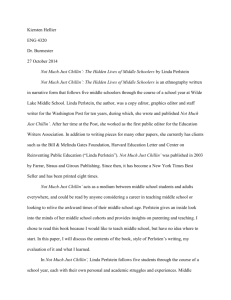Technology and School Leadership
advertisement
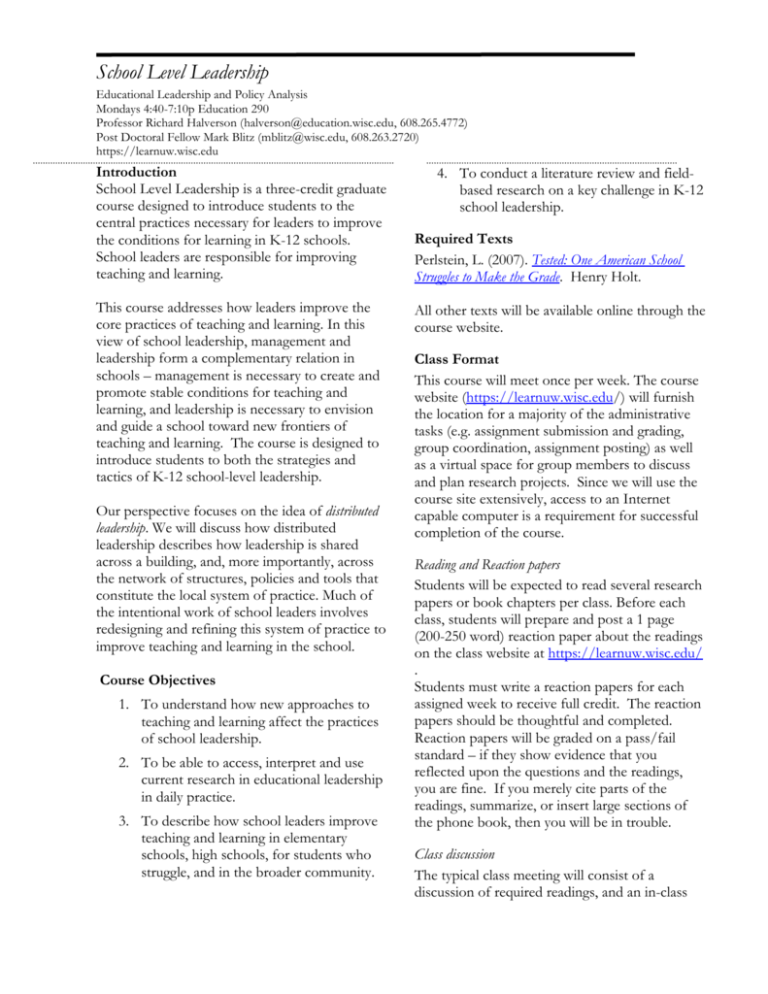
School Level Leadership Educational Leadership and Policy Analysis Mondays 4:40-7:10p Education 290 Professor Richard Halverson (halverson@education.wisc.edu, 608.265.4772) Post Doctoral Fellow Mark Blitz (mblitz@wisc.edu, 608.263.2720) https://learnuw.wisc.edu Introduction School Level Leadership is a three-credit graduate course designed to introduce students to the central practices necessary for leaders to improve the conditions for learning in K-12 schools. School leaders are responsible for improving teaching and learning. This course addresses how leaders improve the core practices of teaching and learning. In this view of school leadership, management and leadership form a complementary relation in schools – management is necessary to create and promote stable conditions for teaching and learning, and leadership is necessary to envision and guide a school toward new frontiers of teaching and learning. The course is designed to introduce students to both the strategies and tactics of K-12 school-level leadership. Our perspective focuses on the idea of distributed leadership. We will discuss how distributed leadership describes how leadership is shared across a building, and, more importantly, across the network of structures, policies and tools that constitute the local system of practice. Much of the intentional work of school leaders involves redesigning and refining this system of practice to improve teaching and learning in the school. Course Objectives 1. To understand how new approaches to teaching and learning affect the practices of school leadership. 2. To be able to access, interpret and use current research in educational leadership in daily practice. 3. To describe how school leaders improve teaching and learning in elementary schools, high schools, for students who struggle, and in the broader community. 4. To conduct a literature review and fieldbased research on a key challenge in K-12 school leadership. Required Texts Perlstein, L. (2007). Tested: One American School Struggles to Make the Grade. Henry Holt. All other texts will be available online through the course website. Class Format This course will meet once per week. The course website (https://learnuw.wisc.edu/) will furnish the location for a majority of the administrative tasks (e.g. assignment submission and grading, group coordination, assignment posting) as well as a virtual space for group members to discuss and plan research projects. Since we will use the course site extensively, access to an Internet capable computer is a requirement for successful completion of the course. Reading and Reaction papers Students will be expected to read several research papers or book chapters per class. Before each class, students will prepare and post a 1 page (200-250 word) reaction paper about the readings on the class website at https://learnuw.wisc.edu/ . Students must write a reaction papers for each assigned week to receive full credit. The reaction papers should be thoughtful and completed. Reaction papers will be graded on a pass/fail standard – if they show evidence that you reflected upon the questions and the readings, you are fine. If you merely cite parts of the readings, summarize, or insert large sections of the phone book, then you will be in trouble. Class discussion The typical class meeting will consist of a discussion of required readings, and an in-class Inquiry in Educational Leadership and Policy Analysis activity such as a guest speaker, a case study discussion or a survey. Since class discussions are vital to the success of the class, your attendance and participation are important and will contribute to your final course grade. The Final Presentation will have two parts: a 20 page paper summarizing the work you have completed this semester, and an oral presentation. But not just any old oral presentation …. but a Pecha-Kucha!!! Successful class discussions also involve tolerance and respect for the diversity of opinions expressed by your colleagues. While overt expressions of intolerance, such as sneers, eye rolling and dismissive gestures, are clearly objectionable, subtler behaviors, such as zoning out or dominance of class discussion are also not acceptable. St. Thomas Aquinas argued that people are naturally civil and rational when they construct the appropriate social arrangements. Let’s create this arrangement together so our civility and rationality can blossom for all to see. A Pecha-Kucha is a tightly-scripted 4-5 minute presentation that consists of 20 images and 20 seconds on each image. There will be class time to workshop your Pecha-Kucha presentation for timing and clarity. See here for more detail http://www.pecha-kucha.org/ (and, if you really like it, there are Pecha Kucha competitions!!) Course Project The course project is a semester-long individual project designed to understand how school leaders improve the conditions of teaching and learning. Much of a school leader’s job involves problem solving whether that means “putting out fires” on a daily basis or implementing a long term strategy to address a school’s deficiency. Ideally, by focusing on the latter type of problem through structuring effective and efficient systems of practice, a school leader would then not need to spend as much time on the spontaneous issues that arise. Your job for this project is to: Identify an core challenge topic/issue for school leaders to address in redesigning school instructional practices; Discuss state-of-the art solutions in this area from research and from practice; Outline viable short-term and long-term strategies to change practices in a school. Parts of the paper will be due throughout the semester: 1. 2. 3. 4. Challenge identification - October 8 Literature review – October 29 Field Work – December 3 Final Presentation & Paper – December 17 ELPA 845 ELPA Portfolio In accordance with PI 34, the Department has created a portfolio requirement for all certification students. Students seeking certification as Principal, Director of Instruction, Director of Special Education and Pupil Services, or Superintendent, will be able to take part in the processes leading to the successful completion and presentation of their own portfolio. Each portfolio is comprised of five components: four dimensions of leadership, and a personal vision statement. Students will create exhibits for the components that will help to demonstrate their leadership proficiency in each of the dimensions that coincide with the Department’s mission and vision. For more information about the ELPA Portfolio, please visit: http://www.education.wisc.edu/elpa/academics/ degrees/certificationprogs.html Full Inclusion We seek to fully include persons with disabilities in this course. Please let us know if you need any special accommodations in the curriculum, instruction, or assessments in this course to enable you to fully participate. We will try to maintain the confidentiality of the information that you share with me. Please contact us as early in the course as practicable. You may also contact the McBurney Disability Resource Center, 305 Linden Drive (263-2741 or FrontDesk@mcb.wisc.edu) if you have questions 2 Inquiry in Educational Leadership and Policy Analysis about campus policies and services. Questions or concerns about disability accommodations can be brought to the attention of Associate Dean Mariamme Whatley (262-2463) or the Educational Leadership and Policy Analysis office (251-2486). Grading Grades for the course will be calculated according to the University of Wisconsin grading scale. Class work will count in the following proportions toward your final grade: 35% Reaction papers Reaction papers will be graded on a pass/fail basis. Late papers may be submitted, but will not count toward your total. 15% 50% Class participation and attendance Course Project Class Schedule 1: 9-10 Introduction, Distributed Leadership Spillane, J. P., Halverson, R., & Diamond, J. (2001) Investigating school leadership practice: A distributed perspective. Education Researcher, April 2001. P. 23-27. 2: 9-17 Organizing Schools for Improvement Bryk, A., Sebring, P., Allensworth, E., Luppescu, S. & Easton, J. Q. (2010). Organizing Schools for Improvement: Lessons from Chicago. University of Chicago Press. (Ch. 1-3). 3: 9-24 Leadership for Elementary Schools Perlstein, L. (2007). Tested: One American School Struggles to Make the Grade. Henry Holt. (Ch. 112) Play 4: 10-1 ELPA 845 Perlstein, L. (2007). Tested: One American School Struggles to Make the Grade. Henry Holt. (Ch. 13-end) Laureau, A. (1987). Social Class Differences in Family-School Relationships: The Importance of Cultural Capital. Sociology of Education 60. 7385. 5: 10-8 Improv! Challenge Topic Identification 6: 10-15 Leadership for High Schools Ferguson, R. (2009). How high schools become exemplary: Ways that leadership raises achievement and narrows gaps by improving instruction in 15 public high schools. Ito, M., Horst, H., Bittanti, M., boyd, d., HerrStephenson, B., Lange, P.G., Pascoe, C. J., & Robinson, L. (2009). Living and Learning with New Media: Summary of Findings from the Digital Youth Project. MacArthur Reports on Digital Learning. Losen, D.J. (2011). Discipline Policies, Successful Schools, and Racial Justice. Boulder, CO: National Education Policy Center. 7: 10-22 Assessing and Improving Student Learning Bennett, R. E. & Gitomer, D. H. (2008). Transforming K-12 Assessment: Integrating Accountability Testing, Formative Assessment, and Professional Support. Educational Testing Service RM-08-13. Frohbieter, G., Greenwald, E., Stecher, B. & Schwartz, H. (2011). Knowing and doing: What teachers learn from formative assessment and how they use the information. (CRESST Report 802). Los Angeles, CA: University of California, National Center for Research on Evaluation, Standards, and Student Testing (CRESST). Leadership for Elementary Schools 3 Inquiry in Educational Leadership and Policy Analysis Koretz, D. (2008). Measuring up: What education testing really tells us. American Educator, Fall 2008. 1-5. 8: 10-29 Team Building Brown & Thomas – New Culture of Learning Halverson et. al. DDIS Literature review due 9: 11-3 Assessing and Improving Teacher Learning Glazerman, S., Goldhaber, D., Loeb, S., Raudenbush, S., Staiger, D. O., Whitehurst, G. J. (2011) Passing Muster: Evaluating Teacher Evaluation Systems. Brown Center on Education Policy at Brookings. Halverson, R. (2010) School Formative Feedback Systems. Peabody Journal of Education 85. 130-146. Wenger, E., McDermott, R & Snyder, W. (2001). Cultivating Communities of Practice. Harvard Business School Press. (Ch. 1) 10: 11-12 Assessing School Leadership Wallace Foundation. (2009). Assessing the effectiveness of school leaders: New Directions and New Processes. Kelley, C. Halverson, R., Blitz, M., Salisbury, J., Modeste, M., Dikkers, S. & Camburn, E. (2012) The Comprehensive Assessment of Leadership for Learning: A Next Generation Formative Evaluation and Feedback System. Fuchs, D. & Fuchs, L. S. (2006). Introduction to Response to Intervention: What, why and how valid is it? Reading Research Quarterly 41/1. 93-99. 12: 11-26 Panel: Team Building Collins, J. (2001). Good to Great: Why some companies make the leap….and others don’t. HarperCollins: NYC. (Ch. 3) 13: 12-3 Panel: Time Allocation Field Work Due 14: 12-10 Community Relations Sheldon, S. B. & Epstein, J. L. (2002) Improving Student Behavior and School Discipline with Family and Community Involvement. Education and Urban Society 2002 35:4. Noguera, P. (1999). Transforming urban schools through investments in social capital. Inmotion. Miller, P. M., Gibson, J. D., Balslev, G. M., & Scanlan, M. (2012). Looking Beyond Harlem: International Insights for Area-based Initiatives: Area-based initiatives in France and the United Kingdom offer lessons for other countries. Middle School Journal 44(1). 16-24. 15: 12-17 Final Project Presentations CALL Survey 11: 11-19 Student Services Bal, A., King-Thorius, K. A. & Kozleski, E. (2012) Culturally responsive behavioral support matters. Tempe AZ: The Equity Alliance. Frattura, E. & Capper, C. (2007). Leadership for Social Justice in Practice: Integrated Comprehensive Services for All Learners. Corwin Press: San Francisco. ELPA 845 4
